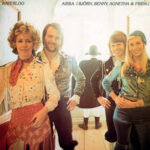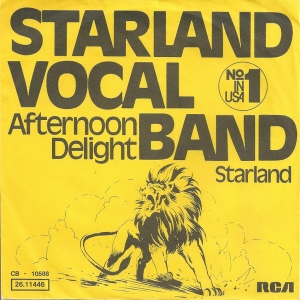 Before 1974, the pop landscape had never seen a band quite like ABBA. Hailing from Sweden, with a penchant for sparkling outfits, perfect harmonies, and infectious melodies, the group would go on to become one of the most successful acts in music history. But it all truly began with “Waterloo,” the electrifying song that introduced ABBA to the world stage and forever changed their destiny. Released in early 1974, “Waterloo” didn’t just win the Eurovision Song Contest—it blew it wide open. It wasn’t just a single—it was a declaration of sonic war, a glittery cannon blast that signaled the rise of a band whose musical empire would stretch across continents and generations.
Before 1974, the pop landscape had never seen a band quite like ABBA. Hailing from Sweden, with a penchant for sparkling outfits, perfect harmonies, and infectious melodies, the group would go on to become one of the most successful acts in music history. But it all truly began with “Waterloo,” the electrifying song that introduced ABBA to the world stage and forever changed their destiny. Released in early 1974, “Waterloo” didn’t just win the Eurovision Song Contest—it blew it wide open. It wasn’t just a single—it was a declaration of sonic war, a glittery cannon blast that signaled the rise of a band whose musical empire would stretch across continents and generations.
“Waterloo” is not just a historical marker in ABBA’s rise; it is a pop masterpiece that blends bombastic glam rock, infectious Euro-pop, and clever lyrical metaphors to deliver a song that is as euphoric today as it was over fifty years ago. With a tight arrangement, a perfectly balanced vocal duet, and production that reflects both the glam era and the coming disco wave, “Waterloo” is a textbook case of how to launch a global career.
The song’s origins lie in ABBA’s strategic decision to win Eurovision. The previous year, they had entered the Swedish selection with the song “Ring Ring,” which had commercial promise but failed to secure a victory. That loss taught them a crucial lesson: to win Eurovision, they would need to go bigger, bolder, and fully embrace spectacle. So they returned to the drawing board with their songwriting team of Benny Andersson, Björn Ulvaeus, and their manager Stig Anderson. Together, they crafted “Waterloo,” a song that would stand out among more traditional ballads and cabaret-style entries.
What made “Waterloo” a stroke of genius was its bold marriage of lyrical metaphor and historical allusion with unabashed pop sensibilities. Rather than penning a straightforward love song, they used Napoleon’s defeat at the Battle of Waterloo as a metaphor for romantic surrender. It was cheeky, clever, and refreshingly unexpected. The lyrics, sung with joyful resignation by Agnetha Fältskog and Anni-Frid Lyngstad, speak of giving in to love as one might surrender to an invading force: “I was defeated, you won the war.” This blending of high-concept metaphor and buoyant melody gave the song a unique flavor, setting it apart from contemporaries and Eurovision competitors alike.
Musically, “Waterloo” is an adrenaline rush from the opening bar. It explodes with honky-tonk piano, glam rock guitars, and a Phil Spector-style wall of sound. The influence of British glam bands like T. Rex and Slade is unmistakable. Yet, ABBA made it their own by layering in harmonized vocals, tight rhythm guitar, and bright brass interjections. The song doesn’t pause for breath—it rushes forward like a battalion on the move, carrying the listener in its energetic march. The production, handled by Benny and Björn, was polished and ambitious for its time, showcasing their growing confidence as studio auteurs. It sounded nothing like the average Eurovision entry—and that was exactly the point.
When ABBA took to the stage at the Eurovision Song Contest in Brighton, England, they did so with a calculated sense of theater. Dressed in outlandishly sequined costumes and knee-high boots, the band looked like pop gods from another planet. The performance was tightly choreographed but brimming with charisma. Their English-language entry stood out against a sea of French, Spanish, and Italian ballads. The crowd erupted. The judges agreed. ABBA became the first act from Sweden—and one of the first performing in English—to win the competition.
That moment was the first major international breakthrough for a non-English-speaking pop act in an Anglophone-dominated market. “Waterloo” hit number one in the UK, Germany, Ireland, and Norway. It climbed to the Top 10 in the United States, an achievement rarely attained by Eurovision winners. In the UK, it became the fastest-selling single of 1974. It was a commercial triumph that set the stage for ABBA’s imperial run over the next eight years, during which they would sell hundreds of millions of records and dominate the global pop scene with a string of indelible hits.
But the legacy of “Waterloo” is about more than just chart positions. It marked the beginning of a pop revolution. ABBA’s clean, melodic, richly produced sound would come to define European pop in the coming decades. Their success made it possible for later artists—both from Sweden and elsewhere—to break into international markets. Roxette, Ace of Base, Robyn, and more recently, Tove Lo and Zara Larsson all owe something to the trail ABBA blazed with “Waterloo.”
The song also helped rehabilitate Eurovision’s image. Prior to ABBA’s win, the contest was often dismissed by critics as kitschy, outdated, or irrelevant to modern pop music. But with “Waterloo,” Eurovision was suddenly cool. Here was a band that had gone from the Eurovision stage to world domination. In doing so, they validated the contest as a viable launchpad for global pop careers. It set a precedent later followed by acts like Céline Dion and Måneskin.
Critically, “Waterloo” has aged exceptionally well. It is often cited as one of the best Eurovision songs of all time and remains a staple in ABBA retrospectives. In 2005, it was voted the best song in Eurovision history during the contest’s 50th anniversary celebration. Its joyous energy, clever wordplay, and flamboyant style make it a perfect encapsulation of everything that makes ABBA great: melody-driven songwriting, studio craftsmanship, playful theatricality, and emotional accessibility.
What’s perhaps most striking is how “Waterloo” continues to resonate across generations. Its inclusion in the Mamma Mia! stage musical and film adaptation brought it to a whole new audience, reigniting interest in ABBA’s catalogue and cementing the song’s status as a timeless anthem. Kids who weren’t born until decades after its release now sing along with the same gusto as their parents and grandparents. That kind of cross-generational relevance is rare for any song, let alone one born out of a televised singing competition.
From a cultural standpoint, “Waterloo” also stands as an early chapter in the global rise of Scandi-pop. Before Max Martin dominated the American charts, before producers from Stockholm became the secret weapons behind artists like Britney Spears, Taylor Swift, and Katy Perry, there was ABBA. And before “Dancing Queen” or “Mamma Mia,” there was “Waterloo”—the first strike.
Lyrically, it’s worth revisiting how brilliantly the metaphor of historical defeat is turned into something euphoric. Most breakup or love songs tend to either wallow in sadness or bask in triumph. “Waterloo” strikes a unique balance: it’s a song about giving up, and yet it feels like a celebration. This is surrender with glitter cannons. The “defeat” in love is transformed into a kind of liberation. “I feel like I win when I lose,” the lyrics proclaim—a sentiment that could only be delivered with a wink and a killer hook. It’s clever, subversive pop writing at its best.
Vocally, Agnetha and Anni-Frid are in top form, blending their voices into a melodic weapon. Their harmonies are bright, confident, and joyful—perfectly matched to the energy of the instrumentation. Their chemistry is undeniable, and it’s easy to see why ABBA’s dual lead vocal format became one of their greatest strengths. The voices don’t just sing the lyrics; they embody the feeling behind them. The jubilant surrender is palpable in every syllable.
Instrumentally, “Waterloo” is a dazzling piece of pop architecture. The driving piano riff, the tight rhythm section, the jubilant brass, and the glam rock guitar flourishes all work in unison. It’s a wall of sound without being overwhelming. Every element has its place, and nothing feels overdone. Benny and Björn’s production choices are masterful—they knew when to let the song breathe and when to push the throttle. The result is a track that feels just as alive and immediate today as it did in 1974.
What’s also impressive is how “Waterloo” manages to be both specific and universal. On one hand, it’s about Napoleon’s defeat. On the other, it’s about every person who has ever been swept up by love and surrendered to it. This duality—the blending of the historical and the personal—gives the song an enduring thematic richness that few pop songs attempt, let alone pull off.
In terms of ABBA’s broader career, “Waterloo” remains a cornerstone. It was their first number one in many countries, and it proved that a Swedish pop group could compete on a global scale. It set the tone for everything that followed: the lush production of “Fernando,” the disco brilliance of “Dancing Queen,” the heartbreaking melodies of “The Winner Takes It All.” All of it traces back to “Waterloo”—the moment ABBA announced themselves to the world and the world responded with open arms.
Over the decades, the song has been covered, parodied, and paid homage to countless times. Its title has entered pop culture shorthand as a metaphor for joyful defeat. It’s been used in commercials, movies, and television shows. It’s been played at weddings, school dances, drag shows, and karaoke nights. And every time it plays, something magical happens—people smile, sing along, and for three glorious minutes, surrender to the pure joy of pop music done perfectly.
ABBA would go on to become one of the most enduring and beloved bands in history, with a legacy that continues to evolve. But “Waterloo” was the genesis. It was the sound of a band bursting onto the world stage with a vision that was glittery, audacious, and musically airtight. It was more than a Eurovision entry—it was a turning point. A before-and-after moment in the history of pop.
Looking back now, it’s clear that “Waterloo” wasn’t just a song about a historical loss. It was about victory—personal, artistic, and global. ABBA may have sung about defeat, but with “Waterloo,” they won the world.


